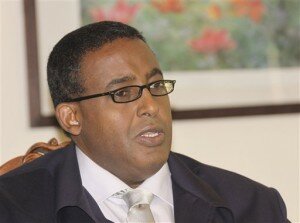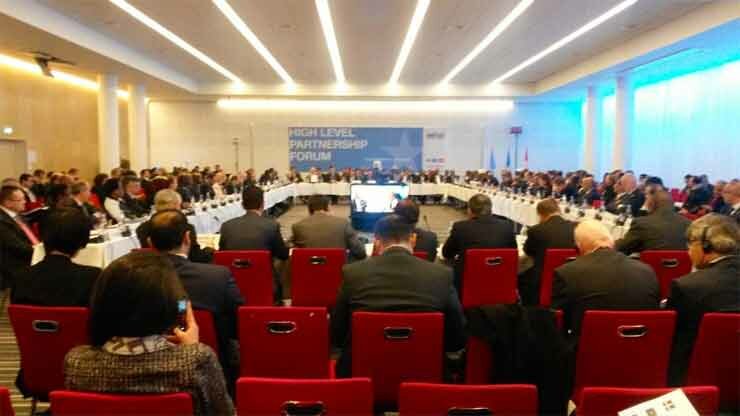Somali leader: Give us resources to pursue pirates

Somalia's Prime Minister Omar Abdirashid Ali Sharmarke speaks during an interview with The Associated Press in Nairobi, Kenya, Thursday April 16, 2009. Somalia's prime minister says his government has identified many pirate leaders but needs more resources to go after them. (AP Photo/Khalil Senosi)
By MICHELLE FAUL and KATHARINE HOURELD – NAIROBI, Kenya (AP) — The United States pressed Somalia on Thursday to root out the pirates menacing the seas off the Horn of Africa, and its prime minister said he could go after them if other nations give him the resources he needs.
That could open the way for more missions to hunt down the pirates inside the lawless country — actions that have been authorized by the United Nations but rarely carried out.
Prime Minister Omar Abdirashid Ali Sharmarke told The Associated Press that his piracy-fighting plan will be ready next week in time for an international conference on Somalia in Brussels.
The international community is grappling with how to confront escalating attacks off the Horn of Africa by larger, bolder and better-armed pirate gangs who menace one of the world’s busiest sea routes — especially after the dramatic rescue of American captain Richard Phillips, who was held for five days by pirates.
Phillips, of the U.S.-flagged Maersk Alabama cargo ship, reached port Thursday in Mombasa, Kenya, aboard the USS Bainbridge, hours after his crew held a joyous reunion with their families at Andrews Air Force Base, Md.
Phillips left the Bainbridge early Friday, and without speaking with reporters, boarded a private executive jet and flew toward the United States. He was expected to reach home in Vermont for a reunion with family and friends after a flight of several hours.
In Nairobi, Sharmarke and the president of the semiautonomous Puntland region met with U.S. diplomats including the ambassador to Kenya, which borders Somalia.
“We want to press them to take action against these pirates who are operating from their territory,” said State Department spokesman Robert Wood. He said the United States was willing to help but has not decided how best to do so.
U.S. Secretary of State Hillary Rodham Clinton announced a new U.S. initiative Wednesday to battle piracy and said she has formed a diplomatic team to press Somali leaders “to take action against pirates operating from bases within their territories.”
Sharmarke said his government is willing to share information that could boost the new U.S. initiative to freeze pirates’ assets and pursue the money trail of their multimillion-dollar ransoms.
“We have information on who is behind this, who is involved,” Sharmarke said. “There is a lot of money flowing in. … We are following very closely how money is distributed here.”
Behind the pirates are some powerful businessmen — and a few high-ranking politicians, according to one captured bandit — people whom Sharmarke said his government has identified.
He said his government is drafting a plan to fight the pirates by building up its military forces and establishing intelligence-gathering posts along its coast. That’s an unrealistic goal, given that his government barely has control of a few square miles in the capital of Mogadishu, and only then because the area is patrolled by African peacekeepers.
Sharmarke said the amount of money the pirates have gotten in the last eight months “is quite enormous.”
“With this capital, they are able to get much more sophisticated weaponry and technology. So it is very sad that we have to still deal with this arms embargo to equip our own forces,” he said. A U.N. arms embargo against Somalia has been in place since civil war broke out there in 1991, but the country is bristling with in illegal weapons.
“So the only way I think we can prevail over this violence is to have a superior capability to deal with this,” Sharmarke said.
Wood said U.S. officials would take up the proposal “as soon as possible” with a 24-nation group that works on Somali piracy.
The European Union said it is increasing its anti-piracy flotilla trying to protect ships in the region from eight to 11, with the addition of three Swedish frigates.
Next week’s international conference on Somalia will be attended by the U.N. secretary-general, Somalia’s president and commanders of an Africa Union peacekeeping force on the ground and the EU flotilla.
Wood said the Obama administration would send its top Africa diplomat, acting Assistant Secretary of State for African Affairs Philip Carter, to the conference. An official from the U.S. Agency for International Development also will attend, he said.
Donor nations are reluctant to fund a government that offers little accountability and has a ragtag, trigger-happy army of 3,500.
Only France, which has taken the most aggressive action against pirates with nine attacks in the past year, has reported pursuing pirates onto Somali soil, and then only once. In April 2008, helicopter-borne French troops swooped on pirates after they released 30 hostages from a luxury yacht, seizing six bandits and recovering sacks of ransom money — apparently paid by the boat owners.
The United States has not had troops in Somalia since its humiliating intervention in 1993, when an attempted hit on a warlord in Mogadishu ended with his fighters downing two Black Hawk helicopters and people dragging the bodies of U.S. soldiers through the streets. A 12-hour firefight killed 300 Somalis and 18 U.S. soldiers. The United States withdrew in 1994.
Washington has attacked in Somalia since then, firing missiles at terrorist suspects several times last year — including one that destroyed the house of reputed al-Qaida leader. Somalis charge dozens of civilians have been killed in the hits.
Similar tactics might be employed against those who fund the pirates, but that would be risky in an area where many civilians live.
French troops have struck three times to free French hostages. But the dangers were highlighted last week when a French yacht owner died in an attack that killed two pirates and freed four hostages.
France opposes paying ransoms, as does Washington.
Until now, ship owners have negotiated, sometimes for months, and paid ransoms in the millions of dollars.
Ransoms first were paid through “hawala,” an informal money-transfer system where Somalis abroad deposit cash and then phone a contact in the country to deliver the money. But as the sums grew, Somali shopkeepers struggled to cope and ship owners began contracting with private security companies that deliver bags of cash by speedboat or drop it from planes.
The crew of the Alabama, whose captain is being hailed as a hero for thwarting a hijack attempt last week, returned the United States and urged stronger protection for ships operating in the treacherous waters.
“We need more security and more patrols in the waterway,” crew member William Rios told interviewers. While he said he wasn’t afraid of going back to sea there, Rios, a New Yorker, said “it would be better to be armed.”
A second attack on a U.S. cargo ship, the Liberty Sun, occurred Tuesday and was unusually violent, said Hugh Martin, general manager of a private British company providing protection for clients in the danger zone. One pirate told the AP that his gang “showered them with rocket-propelled grenades.”
“It’s unprecedented,” Martin said. “It’s not unusual to fire one or two shots and even maybe fire one grenade. But they are not usually that violent.”
It was unclear if the ferocity of the attack was linked to pirate threats to kill Americans to avenge the deaths of three bandits slain by U.S. Navy snipers Sunday to rescue Phillips.
Associated Press writers Jennifer Barchfield in Paris and Matthew Lee in Washington contributed to this report.
Comments
comments
 Calendar
Calendar



































